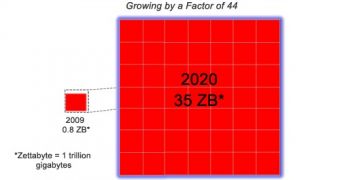For a long period of time, especially in the last century, humankind settled into its role as a consumer society. Information, products, everything was produced by few and consumed by many. Thanks to the Internet, that is changing, everyone is a creator today, for example, by simply posting a tweet. This newfound creativity, though, has a very measurable side effect, it produces a huge amount of digital data.
In fact, ‘huge,’ may not even begin to cover it, this year, the “Digital Universe,” the total amount of data stored in the world’s computers, will surpass a zettabyte. One zettabyte is equal to a million million gigabytes, a number so large it is hard to get our minds around it. In fact, humans will produce more data this year alone than in thousands of years of civilization. The total amount of data stored by academic libraries in the US today is about half a million times less than a zettabyte.
In 2009, the Digital Universe amounted to 0.8 zettabytes, according to a report by IDC. In the last year alone, the total amount of digital content in existence grew by an impressive 62 percent. And the trend is accelerating, in just ten years’ time, the Digital Universe will grow by a factor of 44 to reach 35 zettabytes in 2020.
Apparently, that’s enough data to fill DVDs stacked halfway to Mars. And, if you think the numbers are optimistic, the same report proved to have been underestimating the growth rate in previous years. The growth will also be spurred by the transition of TV and radio from analog to digital broadcasting.
What’s even more interesting, the number of files or containers housing and transporting data will grow even faster than the amount of data created. By 2020, they will see a 67-time increase from 2009. As more and more devices are becoming more interconnected, sharing and storing more data, the complexity of the Digital Universe will increase exponentially.

 14 DAY TRIAL //
14 DAY TRIAL //